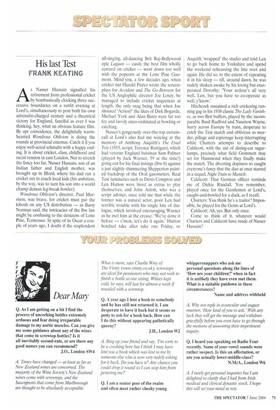His last Test
FRANK KEATING
As Nasser Hussain signalled his retirement from professional cricket by bombastically clocking three successive boundaries on a sunlit evening at Lord's, simultaneously to post both his own adrenalin-charged century and a theatrical victory for England, fanciful as ever I was thinking, hey, what an obvious feature film. By apt coincidence, the delightfully warmhearted Wondrous Oblivion is doing the rounds at provincial cinemas. Catch it if you enjoy well-acted schmaltz with a happy ending. It is about cricket, class, childhood and racial tension in east London. Not to stretch the fancy too far, Nasser Hussain, son of an Indian father and English mother, was brought up in Ilford, where his dad ran a cricket net to coach local kids (his ambition, by the way, was to turn his son into a world champ demon leg-break bowler).
Wondrous Oblivion's director, Paul Morrison, was brave, for cricket must put the kibosh on any US distribution — as Barry Norman said, the intricacies of the lbw law might be confusing to the denizens of Lone Pine, Tennessee. In spite of its Oscar a couple of years ago, I doubt if the resplendent all-singing, all-dancing Brit Raj-Bollywood epic Lagaan — easily the best film wholly centred on cricket — went down too well with the popcorn at the Lone Pine Gaumont. Mind you, a few decades ago, when cricket nut Harold Pinter wrote the screenplays for Accident and The Go-Between for the US Anglophile director Joe Losey, he managed to include cricket sequences at length, the only snag being that when Joe shouted 'Action!' the likes of Dirk Bogarde, Michael York and Alan Bates were far too fey and luwily unco-ordinated at bowling or catching.
Nasser's gorgeously over-the-top curtaincall at Lord's also had me wincing at the memory of Anthony Asquith's The Final Test (1953, script: Terence Rattigan), which had veteran England batsman Sam Palmer (played by Jack Warner, 59 at the time!) going out for his final innings (lbw 0) against a just slightly shimmering Shepperton painted backdrop of the Oval gasometers. Real Test luminaries such as Denis Compton and Len Hutton were hired as extras to play themselves; and John Arlott, who was a script adviser, once told me that while the former was a natural actor, poor Len had terrible trouble with his single line of dialogue, which involved encouraging Warner as he met him at the crease: 'We've done it before — c'mon, let's do it again.' Hutton botched take after take one Friday, so Asquith 'wrapped' the studio and told Len to go back home to Yorkshire and spend the weekend rehearsing the line over and again. He did so, to the extent of repeating it in his sleep — till, around dawn, he was rudely shaken awake by his loving but exasperated Dorothy: 'Your ardour's all very well, Len, but you have to co-operate as well, y'know.'
Hitchcock sustained a rich cricketing running gag in his 1938 classic The Lady Vanishes, as two Brit buffers, played by the incomparable Basil Radford and Naunton Wayne, hurry across Europe by train, desperate to catch the Test match and oblivious as murder, pillage and espionage keep interrupting while Charters attempts to describe to Caldicott, with the aid of dining-car sugarlumps, precisely what field Grimmett may set for Hammond when they finally make the match. The diverting dopiness so caught everyone's fancy that the duo at once starred in a sequel, Night Train to Munich: Caldicott: That German officer reminds me of Dickie Randall. You remember, played once for the Gentlemen at Lord's, caught-and-bowled for a duck, as I recall.
Charters: You think he's a traitor? Impossible, he played for the Gents at Lord's.
Caldicott: Ah, yes. But only once.
Come to think of it, whatever would Charters and Caldicott have made of Nasser Hussain?










































































 Previous page
Previous page